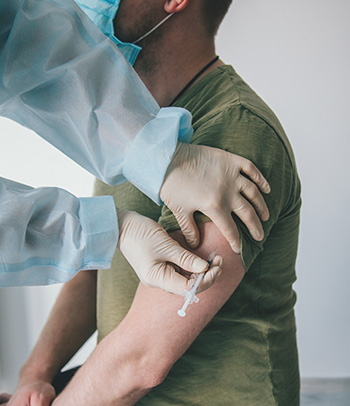The more knowledge you have about your health and wellness, the better prepared and protected you’ll be from whatever comes your way!
Because military members often travel to different parts of the world and sometimes live in close proximity with others, it’s important for military families to be informed about infectious diseases. While most of us have spent time in recent years learning about COVID-19, the flu, and other common infections, how much do you know about meningitis? For many of us, the answer is probably not much.
Learn more about meningitis, its symptoms, and how to protect yourself.
What Is Meningitis?
Meningitis is inflammation or swelling of the lining of the brain and spinal cord. It has several different causes, including bacterial infections, viral infections, parasites, injuries, certain drugs, and more. There are different types of meningitis, including:
- Bacterial meningitis – This is caused by bacteria and is a serious illness that can lead to lasting problems such as brain damage, paralysis, and even death when it’s not treated quickly.
- Viral meningitis – This is caused by a virus and is a less serious illness than bacterial meningitis. Most people get better with treatment.
- Fungal meningitis – This is caused by breathing in fungal spores. It is a very serious illness, most often affecting people with immune system disorders such as cancer or HIV.
- Aseptic meningitis – This is an illness that occurs when there’s inflammation in the brain and spinal cord without bacteria being found. It is often caused by viral or fungal infections, but it can occur as a reaction to certain medicines.
Bacterial and viral meningitis are more common than the others. Bacterial meningitis is of particular concern because it strikes very fast, spreads quickly through the body, and can lead to serious health issues.
What Are the Symptoms?
Viral and bacterial meningitis share many of the same symptoms. The symptoms start suddenly and can include:
- Fever
- Headache
- Stiff neck
- Nausea or vomiting
- Sensitivity to light
- Confusion or altered mental state
- Sleepiness
- Seizures
- Paralysis or weakness
Symptoms in a baby look different and may include being slow or inactive, being more irritable, vomiting or feeding poorly, or having a bulging “soft spot” on the head.
If you think you have symptoms of meningitis, see your health care provider right away. Your provider can determine if you have it, the cause, and the best treatment option.
How Is Meningitis Spread?
Meningitis is spread much like other infectious diseases. For example, meningitis can be spread by droplets in the air when an infected person coughs or sneezes. In addition, people infected with meningitis will have it in their stool, so without proper handwashing, it can be spread by objects you touch and then transfer to your eyes, nose, or mouth. You can also contract it if you share food, eating utensils, or a toothbrush with someone infected with meningitis.
Anyone can get meningitis. There is greater risk for children younger than 5, older adults, people who have had their spleen removed, as well as people who are more likely to come in contact with the meningitis germs in crowded settings. Examples include children in day care, military members living in close quarters, or students in a dorm.
How Is It Treated?
Treatment for meningitis depends on what type of meningitis you have. For bacterial and fungal meningitis, urgent or emergency care is needed. For this, you will most likely be given fluids and antibiotics through an IV to fight infection, along with medicine to reduce inflammation, and maybe even breathing support. For viral meningitis, which is less serious, you can often just rest and drink plenty of fluids while you wait for it to resolve on its own.
To determine the cause of your meningitis and plan the proper treatment, your provider may collect blood samples or fluid surrounding the spinal cord to send out to a lab for test results. You may also receive an MRI or CT scan of the brain to look for swelling or inflammation.
How Can I Protect Myself from Meningitis?
- Wash your hands often with soap and water. Healthy Homefront® has a handwashing article to review the best tips for keeping your hands clean, including using soap, scrubbing for 20 seconds, and drying them completely.
- Don’t share personal items. To avoid picking up germs, avoid sharing food, eating utensils, towels, and drinking glasses with others.
- Get vaccinated. Vaccines offer the best protection against common causes of meningitis. Keeping up to date with recommended vaccines is the best defense. Military members receive certain vaccines as part of their service, but it’s important to protect the entire family. Consult your health care provider about which vaccines are right for you, depending on your risk factors. You can learn more about recommended vaccines through your TRICARE plan.
Stories From Others
Find out how those who’ve had meningitis, such as Ipo Valdez, a former U.S. Army combat medic, overcame this illness, the lasting effects, and how it has changed their life.
The more knowledge you have about your health and wellness, the better prepared and protected you’ll be from whatever comes your way!







